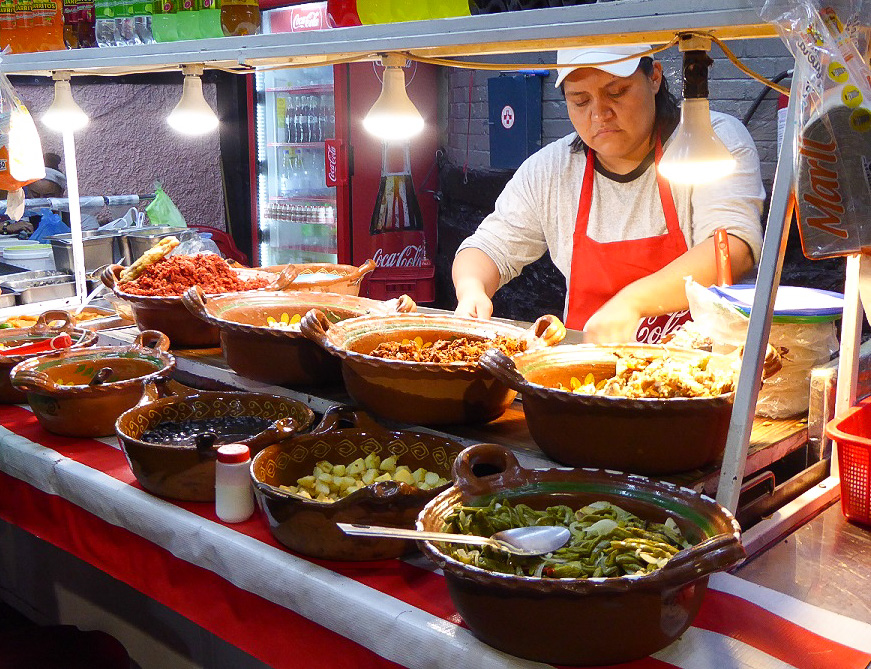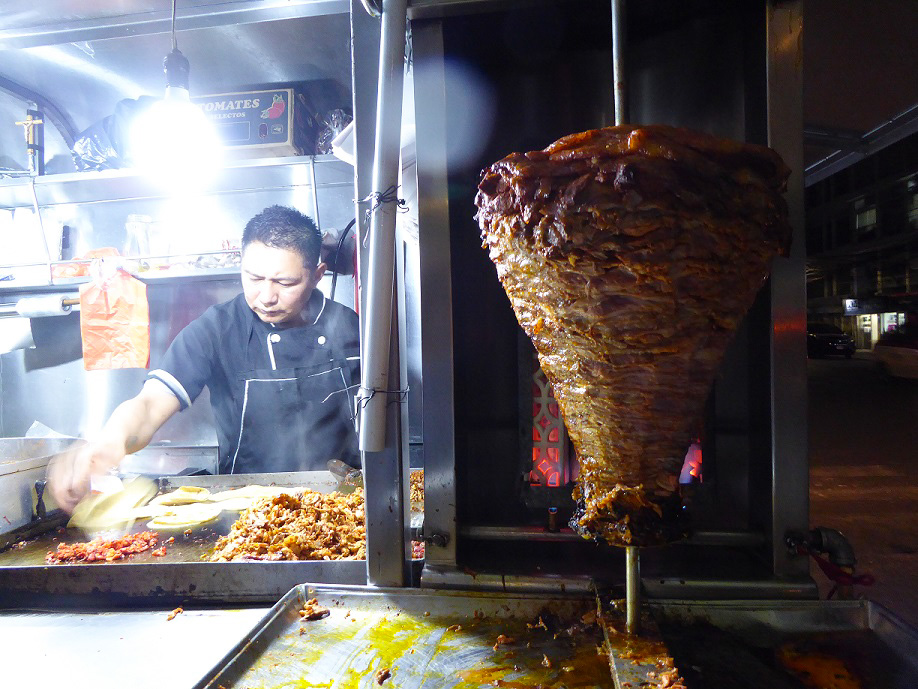Comitan is a Pueblo Magico city located around 2 hours South of the very popular San Cristobal de las Casas in Chiapas. It’s within a 1 hour drive of both the popular sites of El Chiflon waterfalls and Lagunas de Montebello but yet it’s somehow stayed off of the backpacker trail – I saw zero other tourists during my 2 night stay in the city!
Most travellers tend to visit the waterfalls and the lakes on a longgggg (but cheap) day trip from San Cristobal. However, the idea of sitting on a bus for longer than exploring the sites didn’t float my boat so I looked for an alternative. A couple of nights stay in Comitan seemed like the perfect solution!
If you’d also like to visit these spots without a tour, keep reading! I’ve included everything you need to know about how to get to each place and how much it’ll cost.
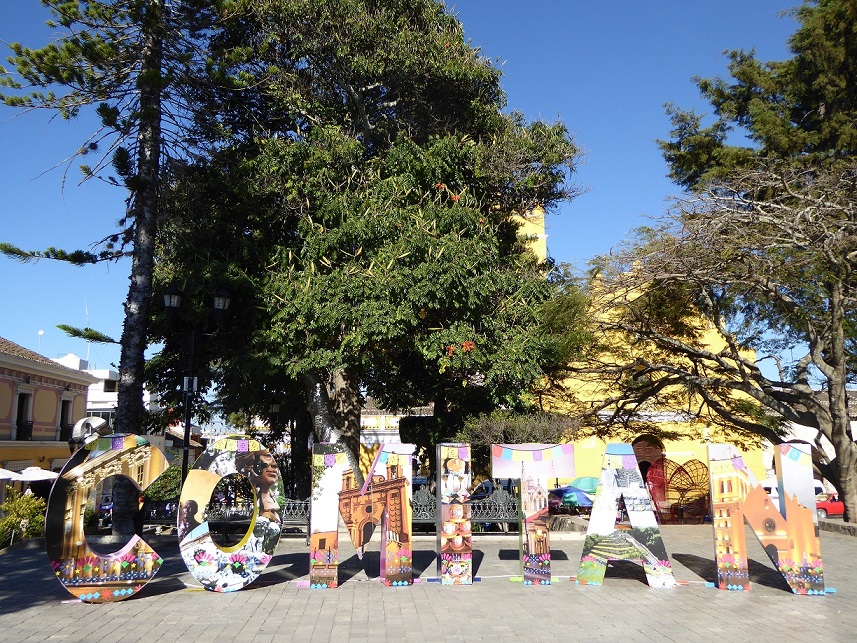
How to get to Comitan from San Cristobal de las Casas?
You can get an ADO or OCC bus from San Cristobal de las Casas bus station to Comitan. Buses run roughly every hour (check the ADO website or App to confirm times), take around 2 – 2 1/2 hours and cost 72 MXN (approx £3.30) each way.
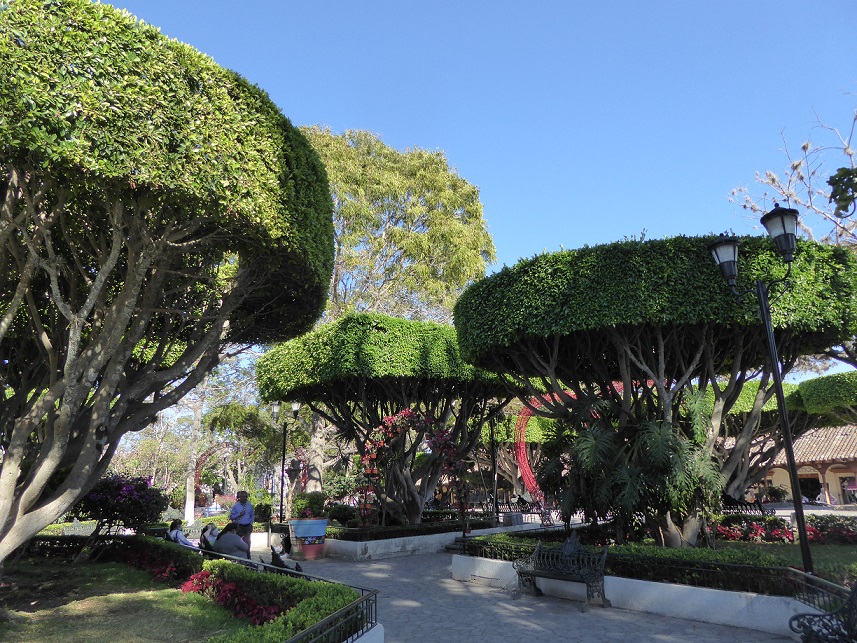
Where to stay in Comitan?
As I mentioned, Comitan isn’t built up for tourism at all, so there are no hostels. Nonetheless, there are lots of different hotels to choose from for varying budgets – I managed to bag myself a private room in a hotel for less than any hostel I’d stayed at in Mexico!
I stayed at Hotel Clasico Colonial for 211 MXN (£9.80) per night. It was very basic but it’s in an excellent location (1 block from the main square) and my room had an en suite. There’s no kitchen or drinking water available but it did the job for a couple of nights!
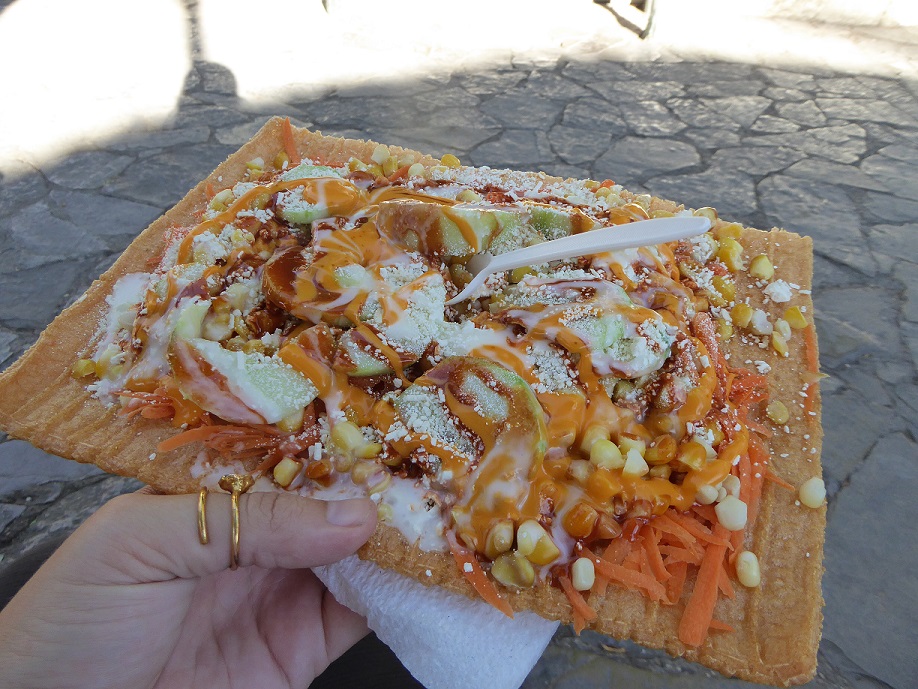
Where to eat in Comitan?
If you’re looking for a cheap bite to eat, there are loads of street stall stands scattered around the main square of the city offering up Mexican classics as well as, a few local Comitan dishes. One of these is cascara preparada (pictured above) – a giant wheat puff topped with corn, shredded carrot, cucumber, sour cream, cheese and salsa.
Alternatively, if you’d rather a sit down restaurant experience, try Ta Bonita (there’s also a cheaper taqueria attached to this restaurant), Tatalampo or Restaurante Doña Chelo.

How to get to the El Chiflon waterfalls from Comitan?
Getting to El Chiflon waterfalls is super easy. Head to the main road where the ADO/OCC bus stop is and you’ll find loads of tour agencies offering collectivos to El Chiflon. When I went (March 2023) a ticket was 40 MXN each way and the journey took around 1 hour.
The collectivo will drop you off on the main road, so you’ll need to walk for 10/15 minutes to the main entrance or take a tuk tuk. On the way, you’ll come across the main entrance where you need to buy your ticket (80 MXN) and then a further 5 minutes walk you’ll spot the museum, toilets and shops.
The entrance to the waterfalls feels a bit like a theme park but once you’re in and lay your eyes on the silky turquoise water of the waterfalls, you will not regret your visit. There’s a very clear path from the entrance, which leads you to alongside all of the waterfalls until you reach the big finale – Cascada Velo de Novia. There are a couple of more viewpoints you can go to from here but I personally didn’t think they were worth the extra incline and sweat.
Instead, head back down to your favourite waterfall, whack out your book and a picnic lunch and just relax and soak up the oasis of El Chiflon. There are also a few spots where you can swim a bit closer to the entrance.
To return to Comitan, you will need to go back to where you were dropped off and stand on the other side of the road to flag a collectivo. I only had to wait 10/15 mins until one arrived.
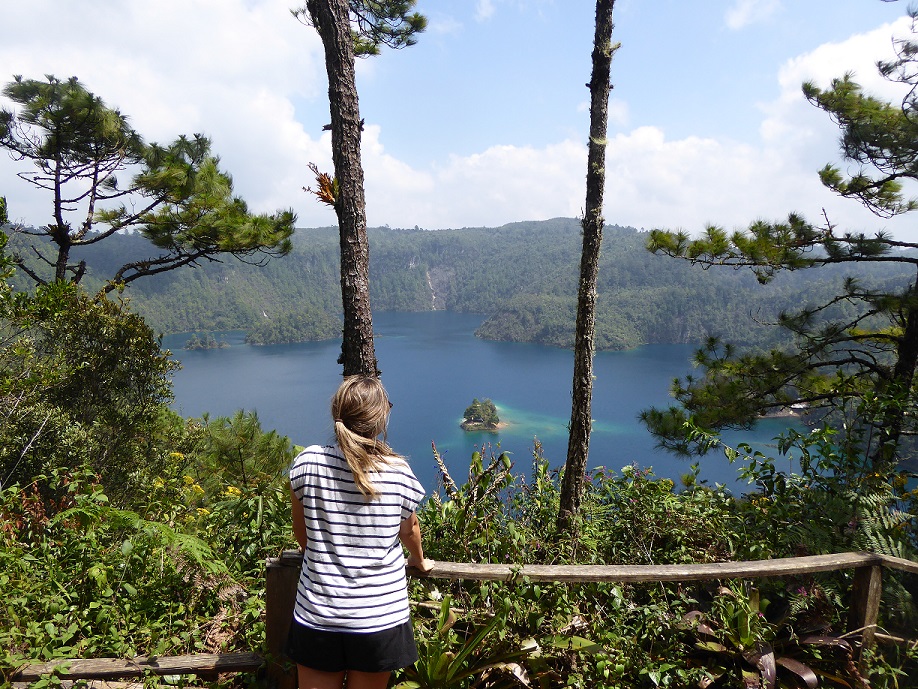
How to get to Lagunas de Montebello from Comitan?
Getting to Lagunas de Montobello is just as simple as it is to get to El Chiflon.
You can get a 1 hour collectivo from here and just let them know which lake you’d like to be dropped off at. I opted for Laguna Pojoj as I wanted to do the Sendero El Perol hike, which takes you through the forest to a number of INCREDIBLE viewpoints of the lakes. You have to pay 30 MXN to enter the area and it takes around 1 1/2 hours each way to complete the walk with stops.
I honestly can’t recommend this hike enough. I didn’t see a single other person during, which meant I had each viewpoint and the end point (a lil patch of grass by the river) all to myself and it’s not too hard considering how high up you go.
After I finished the hike I went to view Laguna Pojoj from the main entrance. This is where the tour buses tend to go so it is a lot more commercialised and I couldn’t help but feel a lil’ bit smug about the incredible experience and views I’d just experienced on my own.
When you’re ready to head home, go back to the road and flag a collectivo going to Comitan. I only had to wait 5 minutes until one went by. I paid 70 MXN to get to the lagoon but 55 MXN to get back. I’m not sure whether this was to do with the quality of bus or where I was picked up/dropped off but it’s worth noting the price may vary.
Taking a long weekend trip to visit the El Chiflon Waterfalls and Lagunas de Montebello from San Cristobal de las Casas was definitely a highlight of my time in Mexico and I would 100% recommend visiting them from Comitan rather than on a long day trip.
]]>Start your day with a hearty plate of chilaquilas at El Cafecito, lounge on the sugary sand of Playa Carrizalillo with a coco frio before flocking to the beaches of Zicatela or La Punta to watch the sunset whilst sipping on happy hour mezcalitas. Sounds tempting eh?
This surfer town’s relaxed atmosphere, pristine beaches and excellent restaurants, bars and nightlife tend to captivate backpackers from the get go making it a hard place to leave.
Before I arrived in Puerto Escondido, I had NO idea how big and spread out the area is. I naively thought it would be a small hub of dusty roads and a beach – boy was I wrong! Puerto Escondido is pretty vast for a beach town and is made up of four main areas, each of which offer something different. During my last 2 weeks here (I told you it’s hard to leave), I’ve stayed in most of the areas, so have compiled this guide to help you choose where’s best for you to base yourself!
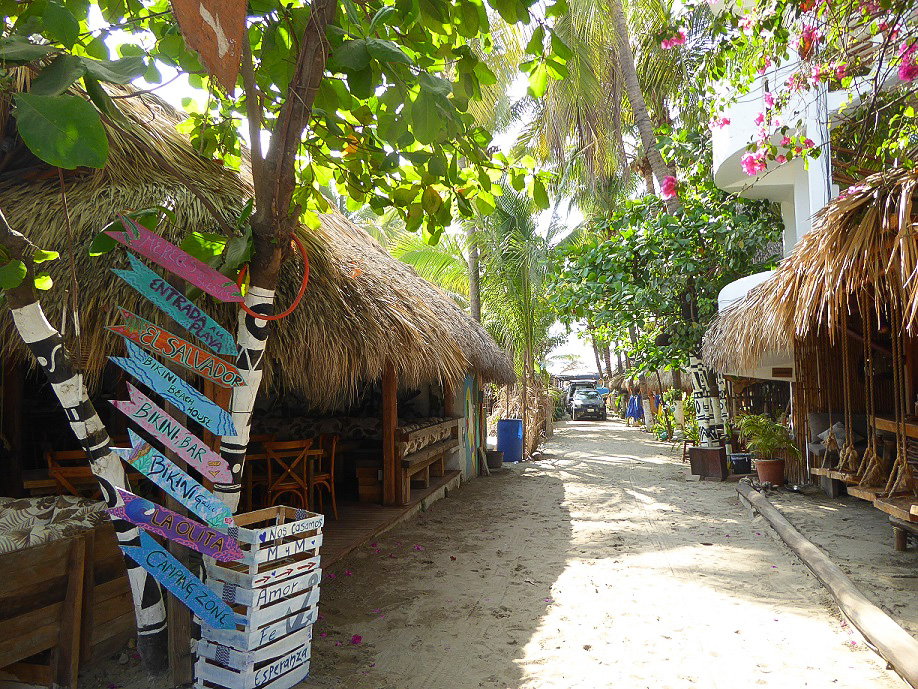
La Punta
Starting at the most Southernly point of the beach you’ll find the bohemian surfer hub of Puerto Escondido – La Punta. This long stretch of beach is great for surfing and tends to draw a younger, backpacker crowd.
The main sandy street in La Punta is compact and lined with trendy (but mostly affordable) bars, restaurants, cafes and shops. Walking down the street in the day you can’t help but be charmed by the thatched dry palm roofs and lush overgrown foliage dotted with brightly coloured flowers.
After sunset, La Punta is the place to go to enjoy live music. Whether it’s bands, open mic night or karaoke, you’ll always find a cacophony of music drawing you into different places. Enjoy a cocktail or three whilst listening to a Latino brass band or try out your salsa moves in a live salsa class. There’s so much here to keep you entertained until 11pm when everything closes down and the party animals head to Zicatela to continue the night…
Where to stay: Casa Punta Hostel
Where to eat/drink: La Chula Taqueria, Fish Shack La Punta, Cafe Ole, Casa de Burrito, Lychee, Pepe’s Fish Tacos
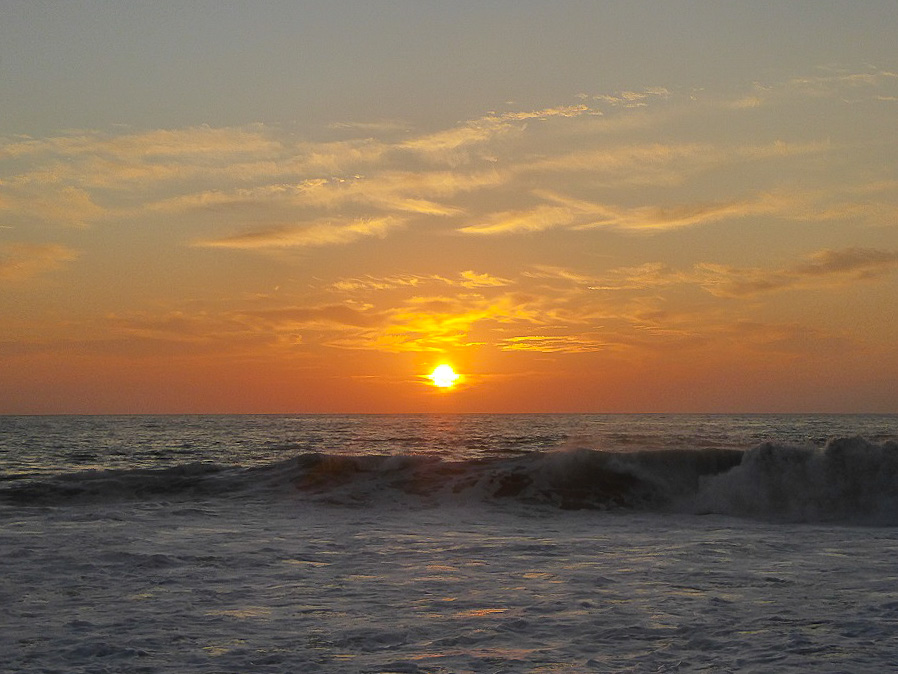
Zicatela
Zicatela is a 30 minute walk or 5 minute taxi/collectivo ride from La Punta and feels more polished than the other areas on this list. It’s renowned for being the place to party, so tends to be a bit deserted in the daytime – on my first day on the beach I was so confused that I had the whole stretch of sand to myself other than a few skydivers floating above my head. It’s empty in the daytime and then everyone reemerges at sunset in time for happy hour.
Zicatela is quite holidaymaker-y and I found it drew more of an influencer/cliquey crowd but it does offer some nice bars, cafes and restaurants worth checking out.
Where to stay: Selina, Huitzilin Hostal
Where to eat/drink: El Cafecito, Spirulina (also great for yoga), Elephant Garden, Brad’s Split Coconut, Finca Las Nievas, La Mariinera (get the fish tostadas – I had my best meal in Mexico to date here)
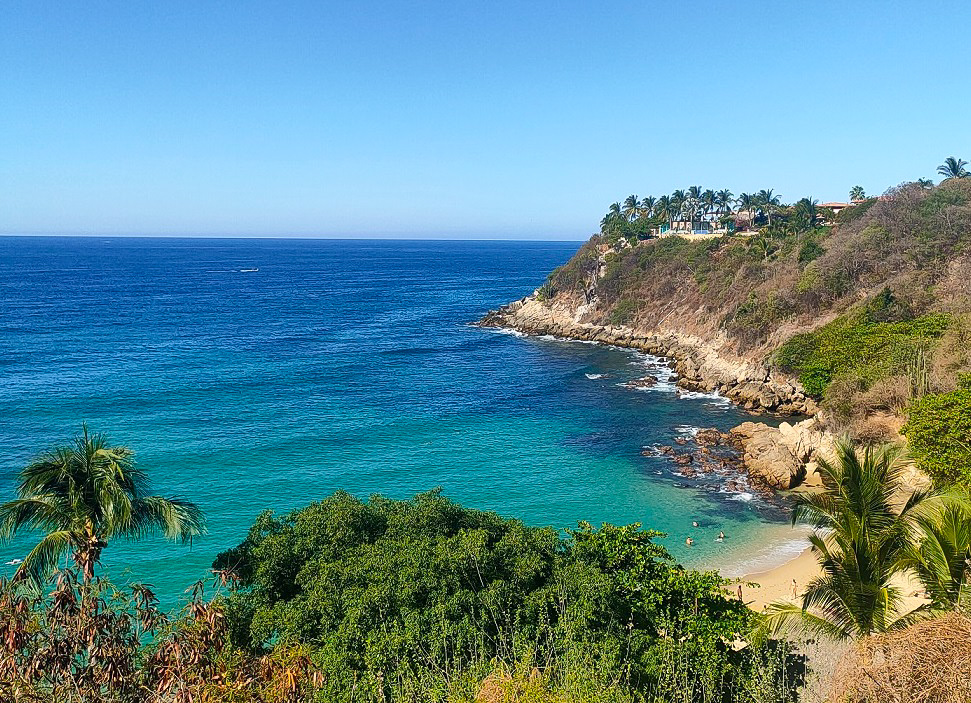
Rinconada
Rinconada can be found just below Centro and is close to the best beaches in Puerto Escondido. Playa Manzanillo, Puerto Angelito and Playa Carrizalillo (this is by far the prettiest beach in Puerto Escondido) are all nestled in alcoves so have bluer, more tranquil water ideal for swimming.
Playa Bococho is a vast stretch of beach a bit further North and is where people flock to every evening at 5pm to release baby turtles into the wild. These releases are run by The Vive Mar project, a non-profit organisation ran by volunteers, and costs 150 MXN (approx £7).
I really enjoyed staying in this area. It was in the perfect spot to explore the different beaches each day and has a bit more of a sleepy, expat feel to it than Zicatela and La Punta. If you stay in this area, there’s also a fantastic sunset spot called Mirador Las Tortugas worth visiting.
Where to stay: Vivo Escondido
Where to eat/drink: El Cafecito, Smoked Fish Tacos El Viejo, Al Dente
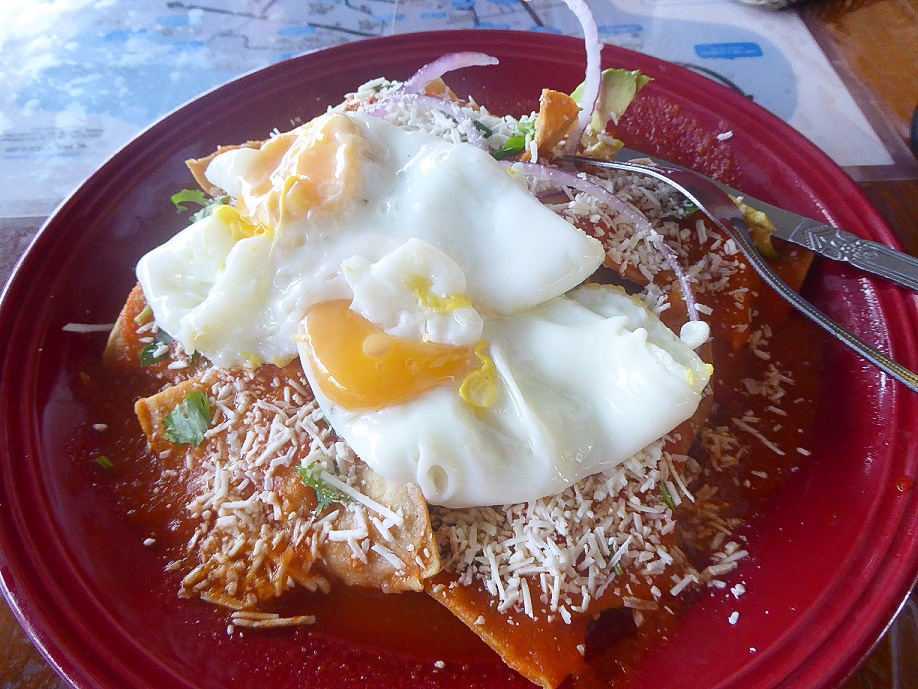
Centro
If you want to experience the undiluted Mexican side of Puerto Escondido, make sure you stay in or visit Centro. This area is about a 15/20 minute walk North of Rinconada and is a more natural representation of Puerto Escondido pre-tourists (it’s also a lot cheaper).
Like most cities in Mexico, you’ll find a busy market (Benito Juarez), street food stalls and lots of shops, restaurants and bars. You might run out of things to do here quite quickly, so I would recommend staying in Rinconada and walking here for a morning or afternoon to explore.
Where to stay: Puerto Dreams Hostel, La Escondida Puerto Dreams, Tower Bridge Hostel
Where to eat/drink: Benito Juarez Mercado, The JP Bunker, Cafe N’duva
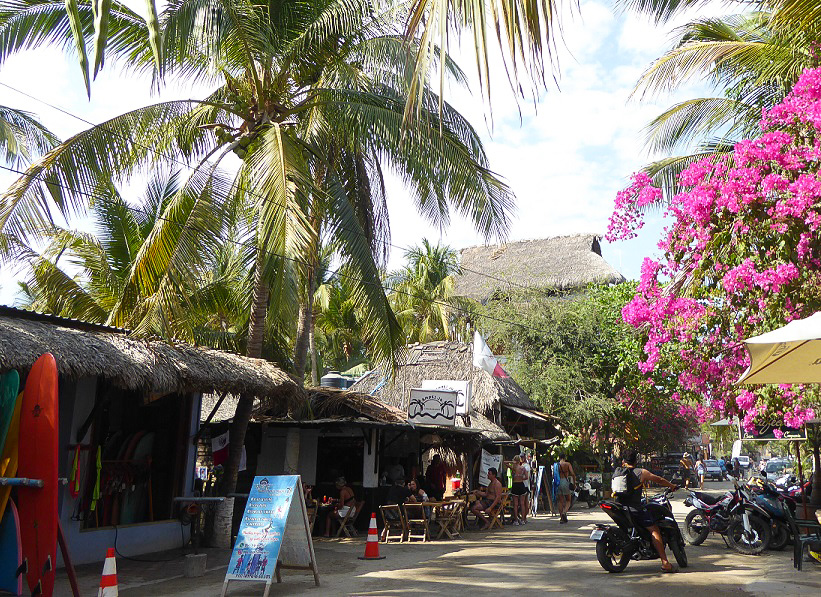
Overview
During my time in Puerto Escondido I stayed in all of these areas except Centro (however I did visit the market here for a morning). If you have time to stay in multiple places, I would recommend staying in La Punta for a few nights and then Rinconada – this will give you the chance to visit all of the above areas and get a proper feel for the many different personalities of Puerto Escondido!
Top top: to get around Puerto Escondido you can hop on a collectivo (pick up trucks with a plastic roof), which shuttle up and down the main road all day for a bargain 10 MXN per ride.
]]>Whenever I arrive in a new country or city, the first thing I book onto is a free walking tour led by a local (I’ve already done four in Mexico)! They’re an amazing way to get your bearings, learn about the history of where you are, tick off a few ‘must see’ attractions and get valuable tips and recommendations from someone who knows the area inside out.
When I first arrived in Mexico City, I was recommended a free walking tour with a difference, a tour focused on tacos. I quickly booked on for the next day – if there’s one thing I love more than a free walking tour, it’s a free walking tour that involves food!
How to Book Onto The Taco Walking Tour
I booked the taco walking tour with a company called Kactus via GuruWalk. The tour takes place in the trendy neighbourhoods of La Roma and Condesa (around a 15 minute drive from the Historic Centre) every day of the week other than Wednesdays and Sundays and lasts around 2 and a half hours.
On the tour you will learn about the history of La Roma and Condesa, where the taco originated from, street food etiquette in Mexico City and most importantly, what food you must try! We went to three different street food stalls over the 2 and a half hours and our guide made sure there were veggie/vegan options at each stop if needed.
The tour is free, but tacos are not included (expect to pay around 20 – 25 MXN per taco) and a tip for the guide is expected (around 200 MXN is customary).
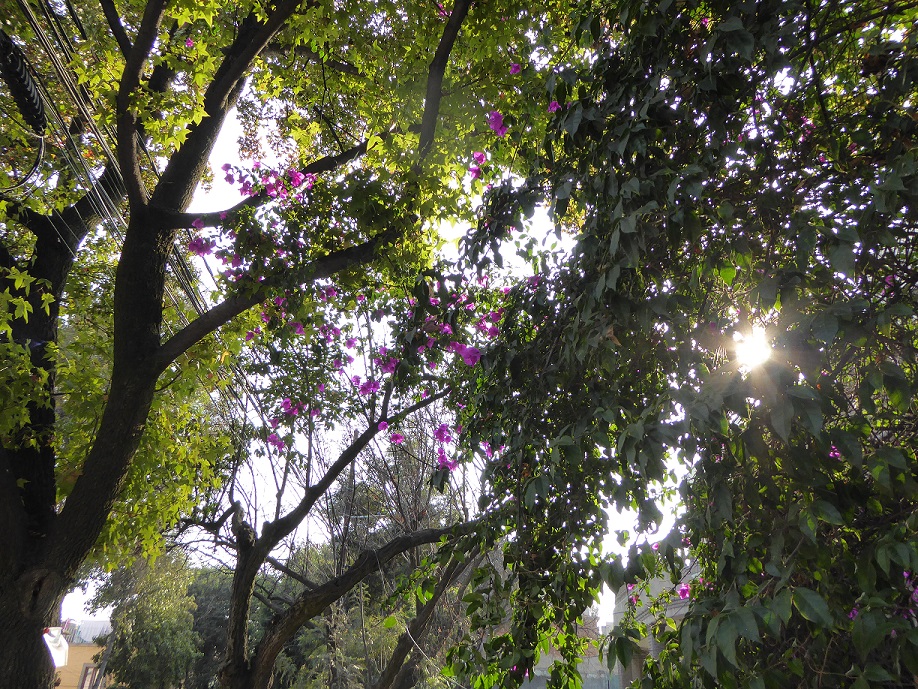
La Roma and Condesa Neighbourhoods
I met our guide, Daniella, and four other taco enthusiasts at 6.15pm by the Fuente de las Cibeles monument in La Roma. After quick introductions Daniella started telling us about the history of La Roma and Condesa.
“La Roma was a neighbourhood for Mexico City’s upper class to escape the crumbling Centro Historico but in 1985 an earthquake led to the collapse of the area and the wealthy found refuge in different areas of the city. Over the past 10 years or so, this area has become more gentrified and is now a safe area to explore with some of the best street food stalls in the city”.
The damaging history Daniella described was evident as we walked around the neighbourhood – colourful art deco mansions decorated with Juliet balconies draped in cascading ivy sat across the street from barren buildings waiting to be loved. Leafy trees woven with vibrant pink flowers lined the uneven, disturbed pathways and bohemian cafes, restaurants and bars were housed in buildings coated in peeling paint and graffiti.
I wasn’t expecting to learn about these popular neighbourhoods, so it was a great surprise and addition to the rest of the tour!
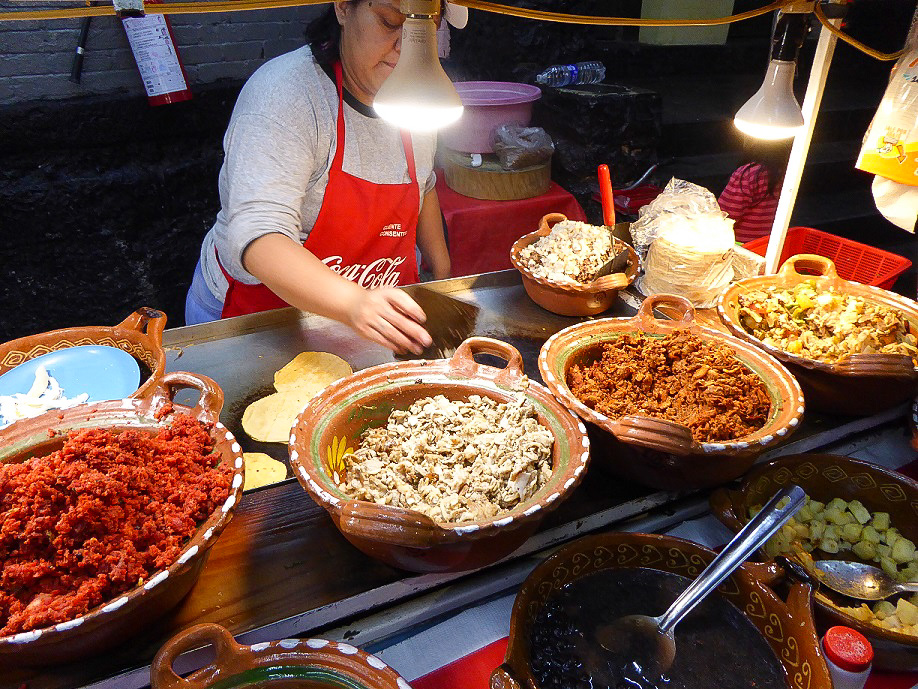
Street Food Etiquette in Mexico
Before we went to our first taqueria (this is what Mexicans call restaurants that specialise in tacos), Daniella gave us a quick overview of the history of the taco and explained that ‘taco’ literally means something in the middle of something else. The history of when and where the taco originated from is a tad uncertain but it’s likely they were created by Mexican silver miners in the 18th century.
Daniella also talked us through some really useful street food etiquette in Mexico, which I’ve been utilising ever since. These included:-
– In Mexico you tend to pay after eating your food
– At most stalls you eat standing up – tacos are more of a snack for Mexicans than a meal
– You should always try a salsa before dousing your tacos in it – they all vary in taste and heat
– Different toppings are meant for different dishes
Armed with this very handy information, we were ready to eat!
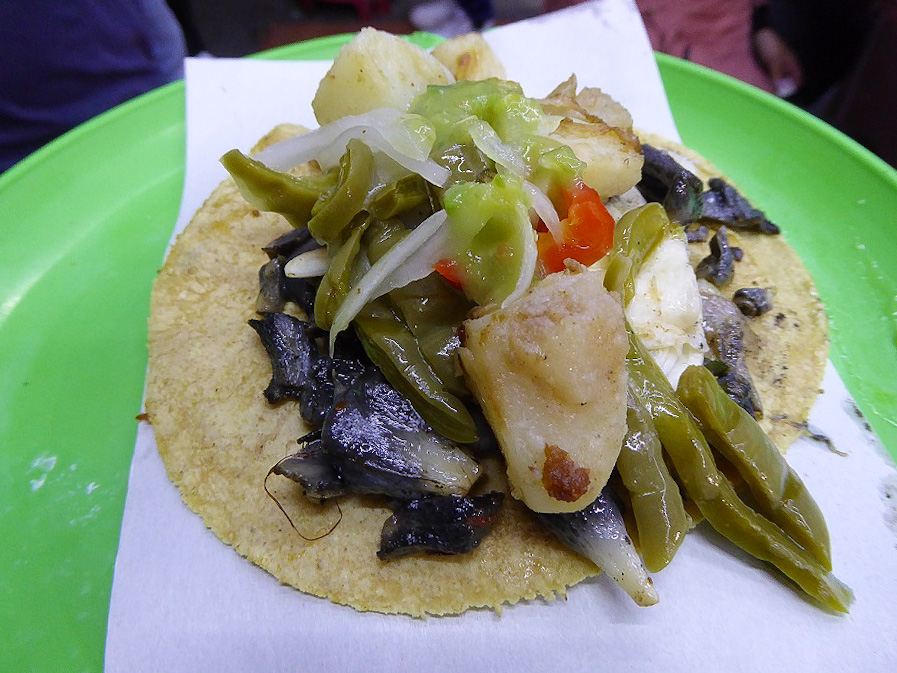
What Tacos Did We Eat?
The first stop on our taco tour was one of Daniella’s favourite stalls and one she said her family have been going to for years.
As we approached the taqueria, we could hear the loud buzz of chatter and laughter as families, couples and clusters of friends stood in circles scooping their choice of toppings onto their taco and shovelling them down before they cooled.
I went for Daniella’s recommendation of fried huitlacoche (a peculiar fungus that grows on corn), cheese, potato, pickled white onion, slithers of cactus and green salsa on top of a freshly cooked corn tortilla. I bit into the warm taco and could instantly taste the corn, which is so synonymous with Central American cuisine. The soft huitlacoche was a bluey, grey colour with a root of yellow and tasted strongly of mushrooms, whilst the sliced cactus tasted like a runner bean. I took a slurp of my sweet agua de horchata, a traditional cold rice and milk-based drink, to cool my mouth from the spicy salsa.
Tacos Al Pastor
Next, Daniella took us to try the king of tacos in Mexico City – Tacos Al Pastor.
Al Pastor came to Mexico with Lebanese immigrants in the early 19th century and is made up of slices of pork marinaded in dried chillies, spices, and pineapple, which is then cooked like shawarma on a rotating spit. The meat is then chiseled into a tortilla and sprinkled with a mixture of finely chopped onions, coriander, and diced pineapple on top to finish.
Being the only vegetarian in the group, Daniella took me to Por Siempre Vegana Taqueria, a vegan food truck across the road, which has created vegan versions of all of the Mexican classic street foods – hallelujah! The meat substitutes were incredible and it was great to feel included whilst everyone else enjoyed their Al Pastor. This is definitely one to try for any veggies or vegans even if it’s not on this tour!
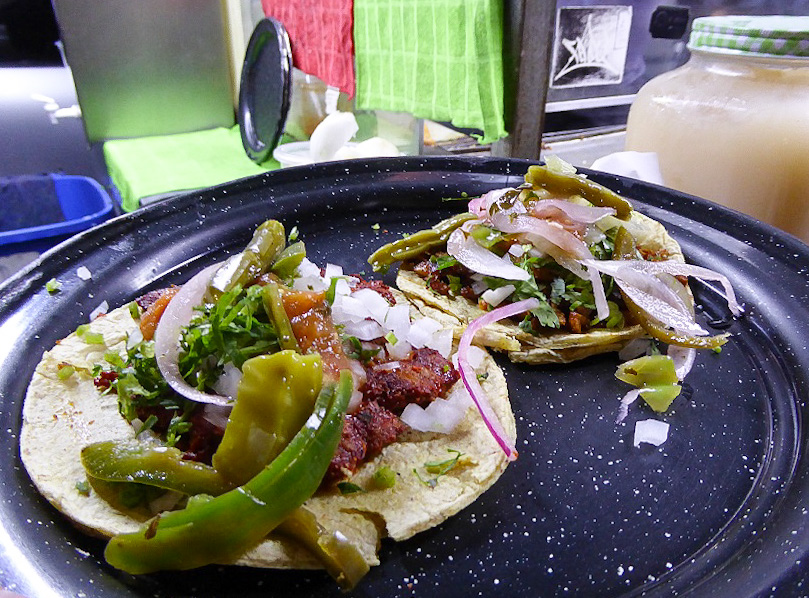
Conclusion
Kactus’ taco walking tour was such a highlight of my time in Mexico City. I learnt so many great tips and tricks about eating at street food stalls, which I’ve been using a lot throughout my time in Mexico and was also able to try some amazing local ingredients I wouldn’t have known about otherwise. If you’re a foodie, this tour should be at the top of your to-do list in Mexico City!
Please note: this is not a sponsored post and all thoughts and opinions are my own.
]]>Food and wine are ingrained in Roman culture and sampling some of the best dishes the city has to offer doesn’t have to cost the earth! From crunchy deep-fried artichoke drizzled in olive oil and flawlessly thin charred pizza to creamy al dente cacio e pepe topped with lashings of parmesan and rich chocolate tiramisu; you can easily try the best of these Roman classics on a budget.
Doing your research, avoiding restaurants too close to tourist spots, and eating where Italians do, are key to the quality of the meals you have and the total cost of your bill. Here’s my top ten budget-friendly eateries in Rome to get you started!
Le Mani in Pasta
Le Mani in Pasta’s entrance is tucked away down a side street in Trastevere.
Begin your meal with a bottle of Primitivo before ordering a starter of sliced seabass sprinkled with truffle. For main, go for the sharing platter of lobster pasta (€40 for 2). Prepare to get messy as you crack and scoop out the lobster and slurp down the perfectly cooked pasta.
The fish is fresh, the service is charismatic, and the bill is always surprisingly low.
Via Dei Genovesi 37 – 00153
Piccolo Buco
Located down a side street near the Trevi Fountain, Piccolo Buco is a small pizzeria with a big reputation. The owner of the restaurant takes such pride in the process of creating their pizza dough, and it shows – the pizzas are works of art!
Each pizza has a puffed-up, crunchy crust framing the base and toppings. You can choose from a white or red base and an impressive selection of toppings including a whole ball of burrata and nduja sausage drizzled with homemade pesto. Pizza prices range from €12 – €18.
Via del Lavatore 91 – 00187
Pastificio Guerra
Representing the fast food of Italy – homemade fresh pasta to-go!
Pastificio Guerra is a small pasta shop just around the corner from the Spanish Steps. From 1pm daily, they open their doors to hungry Italians and tourists desperate to sample their pasta dishes of the day. There are only two types of pasta on offer each day and a takeaway box costs a bargain €4.50.
Via della Croce 8, Piazza di Spagna – 00187
Da Enzo al 29
The inescapable queue outside of Da Enzo al 29 is evidence that this trattoria is legendary.
Da Enzo al 29 is famous for perfecting two popular Roman dishes – deep-fried artichoke and cacio e pepe. Accompany these with the sharing plate of burrata, tomatoes, and basil, and a bottle of your waiter’s recommended red wine, and you’ll soon see why people happily wait over an hour for a table. Mains cost around €12 – €18.
Via Dei Vascellari 29 – 00153
Tonarello
Tonarello sits in a delightful spot opposite the grand Basilica di Santa Maria of Trastevere and its menu relies heavily on recipes that have been passed down from generation to generation.
“Nonna Nadia” (€8.50) is a firm favourite pasta dish consisting of al dente spaghetti tossed in a tomato sauce with aubergine, olives, and capers, as well as their selection of different types of meatballs, served with chicory and roast potatoes (€14.50).
Via della Paglia 1, 2, 3 – 00153
Dar Poeta
Dar Poeta is the epitome of how you’d envision an Italian pizzeria in Rome.
Start with a bottle of their house red wine (€16) and a plate of bruschetta before moving on to the star of the show. Go for the radicchio and gorgonzola pizza (€8.50) if you fancy something rich or the parmigiana (€8.50) for a no-frills tasty topping. Make sure you also leave room for their famous Nutella calzone.
Dar Poeta is affordable, and fuss-free dining in quintessential Italian surroundings.
Vicolo del Bologna 45 – 00153
200 Gradi
200 Gradi is located just around the corner from The Vatican and specialises in fast, affordable sandwiches filled with top-quality Italian ingredients.
If you want to stick with the best of Italian, go for the ‘Cavour’ – parma ham, mushrooms, Italian smoked cheese, rocket, and their home spicy sauce (€7) or, if you fancy something a bit different go for the ’Nicosia’ – gorgonzola, grilled aubergine, rocket salad, and walnut cream (€7). Each sandwich tastes as fresh as it looks and can be eaten in or taken away.
Piazza del Risorgimento 3 – 00192
La Tavernaccia da Bruno
La Tavernacca da Bruno in Trastevere is a family affair. The original owners, Persiani Bruno and Giuliacci Giovanna opened the restaurant in 1968 and now it is run by their two daughters.
The menu boasts affordable, ancient Roman and Lazio recipes using the best locally sourced ingredients. Go for one of their specialties – pappardelle with wild boar, or slow-roasted suckling pig and a bottle or two of their regional wine.
Via Giovanni da Castel Bolognese 63 – 00153
Ai Marmi
Ai Marmi is a pizza institute in Trastevere.
The large restaurant is filled with marble tables that are pushed together to accommodate the masses of people who flock here for cheap, crispy thin pizza.
The menu is extensive, affordable, and includes some interesting toppings such as, courgette and pumpkin flowers. Don’t be surprised if you walk past at 1am and the place is still heaving – it’s the go-to pizza spot day and night. A Pizza will set you back around €6 – €10.
Viale di Trastevere 53, 00153
Pompi
Rumour has it Pompi serves the best tiramisu in Rome!
This patisserie shop has several locations across Rome and serves everything from cakes, desserts, and cannoli to ice cream, coffee, and tiramisu (€5 per slice). You can choose from a selection of tiramisu flavours including original, pistachio, and strawberry and each one is as soft, rich, creamy, and coffee soaked as you’d hope.
See their website for all locations: www.barpompi.it
I hope these top 10 budget-friendly eateries give you some inspo for your trip to Rome!
]]>Marvel at the shimmering Christmas lights, warm up with a spiced mulled wine or hot Aperol from a market stall, browse traditional Hungarian souvenirs and submerge yourself in a natural thermal bath. Here’s how to maximise 24 hours in Budapest!
Morning
Vörösmarty Tér Christmas Market
Once you’ve arrived at your accommodation, wrap up warm and head straight to Vörösmarty Tér Christmas Market – the oldest and most popular market in the city.
Start by perusing the stalls adorned with wreaths, baubles, and twinkling fairy lights. Here you’ll find everything from ceramics, jewellery, and artwork to mulled wine, goulash, and roasted chestnuts. Make sure you sample the traditional Hungarian street food dish Langos, a deep-fried bread topped with garlic butter, sour cream, and cheese before moving on to Hungary’s famous chimney cake with your choice of toppings.
Afternoon
Head to the waterfront where you’ll find the spectacular spikey skyline of Buda Castle and Fisherman’s Bastion across the river Danube. To the right, you’ll also be able to spot the impressive Chain Bridge, which is one of eight bridges connecting Buda and Pest.
Buda Castle and Fisherman’s Bastion
If you’d like to visit Buda Castle and Fisherman’s Bastion hop on the Line 16 bus. Alternatively, you can walk, take a taxi, or jump on the funicular at the bottom of Buda Castle hill. You can visit the castle courtyards for free or organise a tour to go inside.
Once you’re done exploring, walk to Fisherman’s Bastion, which offers outstanding views across Pest including the iconic Hungarian Parliament Building.
Budapest Thermal Baths
If you’d rather spend your afternoon relaxing, visit one of Budapest’s thermal baths. Széchenyi Thermal Baths are the most famous and can be found in City Park. Booking ahead is advised and tickets cost between 9,400 and 10,900 HUF (£20 – £25). Other thermal baths include Gellért, Rudas, and Király.
Evening
St. Stephen’s Basilica Christmas Market
Now’s the time to head back to the city centre to experience the prettiest Christmas Market in Budapest at St. Stephen’s Basilica. This Christmas market is hugged by some of the most beautiful architecture in Budapest and comes alive at night-time – as you approach the road that leads up to the Basilica, you can’t help but be wowed.
A line of wooden market stalls selling strudel, quality handicrafts, and ‘festive punch’ perfectly frame the grand Basilica and sparkling bow-embellished Christmas tree. Beneath the Basilica you’ll find a square with more stalls, a small ice rink, and live music. Make sure you stick around for the festive light show, which projects on the Basilica daily every half an hour from 5.30pm – 10pm.
Dinner
If you want a budget-friendly dinner, grab something from one of the many food street stalls. Warming goulash, crispy potato pancakes, roasted duck leg, and hun-dogs – baguette, pickles, and Hungarian sausage – are all dishes you’ll find everywhere.
Alternatively, head back to your hotel to check-in and freshen up, and then venture out to your choice of restaurant. Budapest has a great restaurant scene and you can sample anything from traditional Hungarian cuisine to Mediterranean, Jewish, and Asian. Well-reputed restaurants to check out include Mazel Tov, Rosenstein, TwentySix, and Café Kor.
Nightlife
After dinner, go to one of the city’s world-renowned ruin bars. These wacky neglected pre-war buildings have become somewhat of an institute in Budapest’s nightlife and are made up of rooms brimming with quirky furniture and a buzzing atmosphere. Some of the most popular ruin bars are Szimpla Kert, UdvarRom and Ellato Kert.
Morning
If time allows head to Cirkusz for breakfast. This trendy café has been coined one of the world’s top brunch spots and serves everything from pulled pork benedict to American pancakes and waffles. You may have to wait for a table but, rumour has it, their eggs benedict is worth missing your flight home for…
24 hours isn’t long to soak up everything Budapest has to offer but I hope this itinerary helps you make the most of the time you have!
]]>
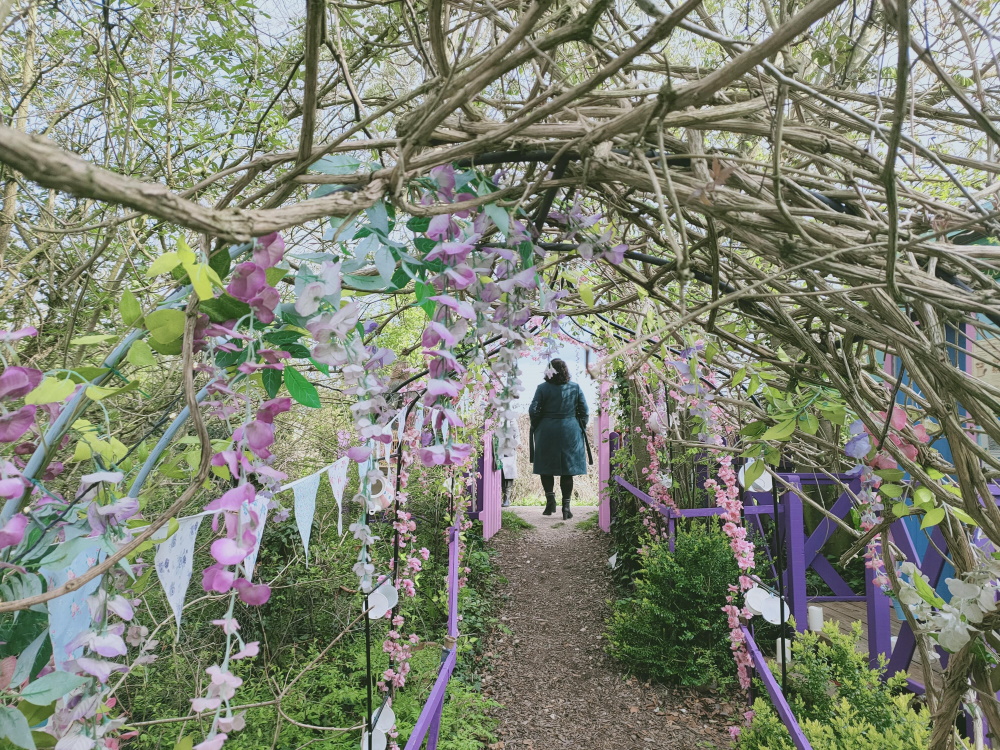
About Jane’s Enchanted Tea Garden
Jane’s Enchanted Tea Garden is a pop up café that opens every year over the summer months (approx. May – September) to deliver delicious afternoon tea in a stunning setting. It’s hidden down a small road adjacent to the canal in Kirtlington and could easily be missed if it wasn’t for the vibrant pink and purple arch entrance prettily entwined with a waterfall of colourful flowers.
Jane has a Facebook group where she posts regular updates about the garden and available dates for booking a table/cancellations. Booking is on a first come first serve basis and is done by contacting Jane directly – you can either send her a text or give her a call. Bookings are secured by transferring a £10 deposit per person, which is then deducted from your bill on the day. Jane is already fully booked this year (yup, that’s how popular this place is!) however, she plans to start taking bookings for next year after she’s wrapped up 2021, so keep your eyes peeled on the Facebook page towards the end of the year!
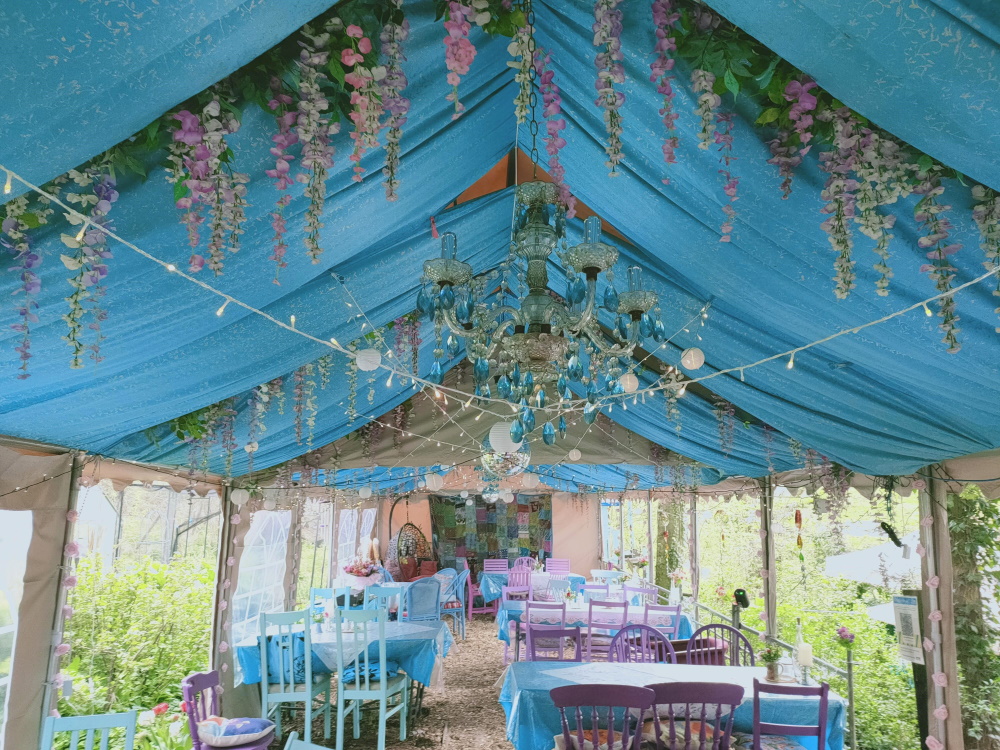
The Enchanted Tea Garden Experience
On entering the garden, we found ourselves weaving our way down a charming archway of twigs draped with bunting, flowers and foliage – with the occasional teasing glimpse of the seating areas and the canal. The décor was an eccentric combination of fairy lights, chimes, tea pots hanging from branches and the occasional random fake cat and milk churn – it was so random, so wacky and I LOVED IT!
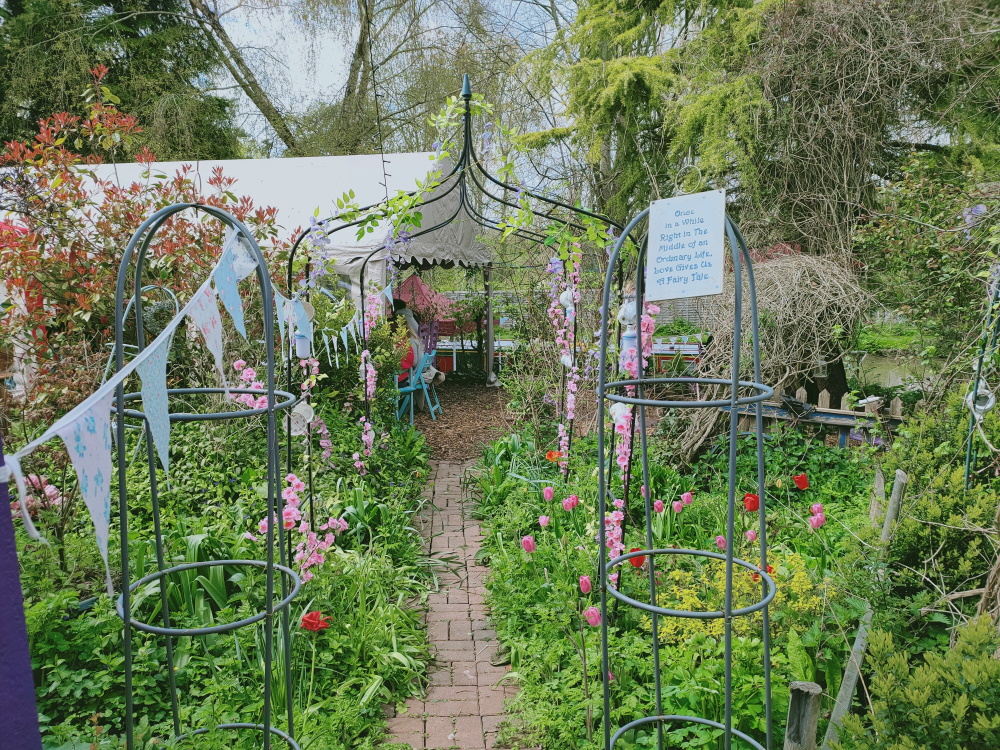
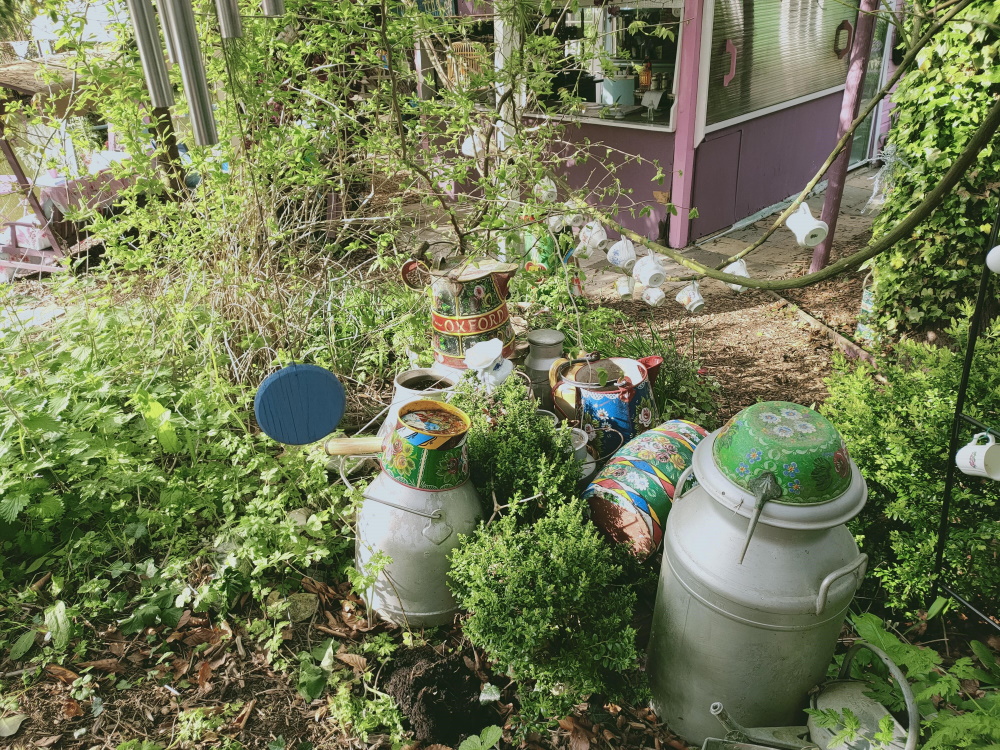
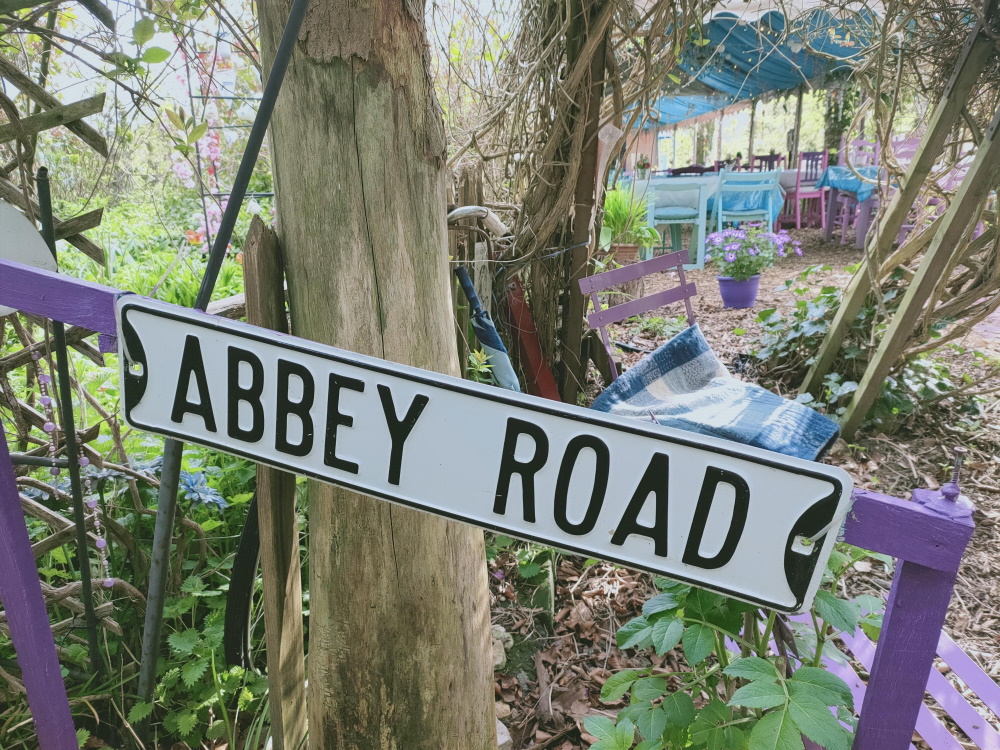
The décor and buzz of customers was accompanied by live folk music being played by the marquee.
Our table was ideally located on its own by the water with a great view of the barge moored up alongside the decking. There was also seating in the beautifully adorned marquee and alongside the barge.
The crockery mirrored the décor and boasted a mishmash of different vintage plates, cups and saucers. It had a very homely, Alice in Wonderland vibe – rustic but oh so charming!
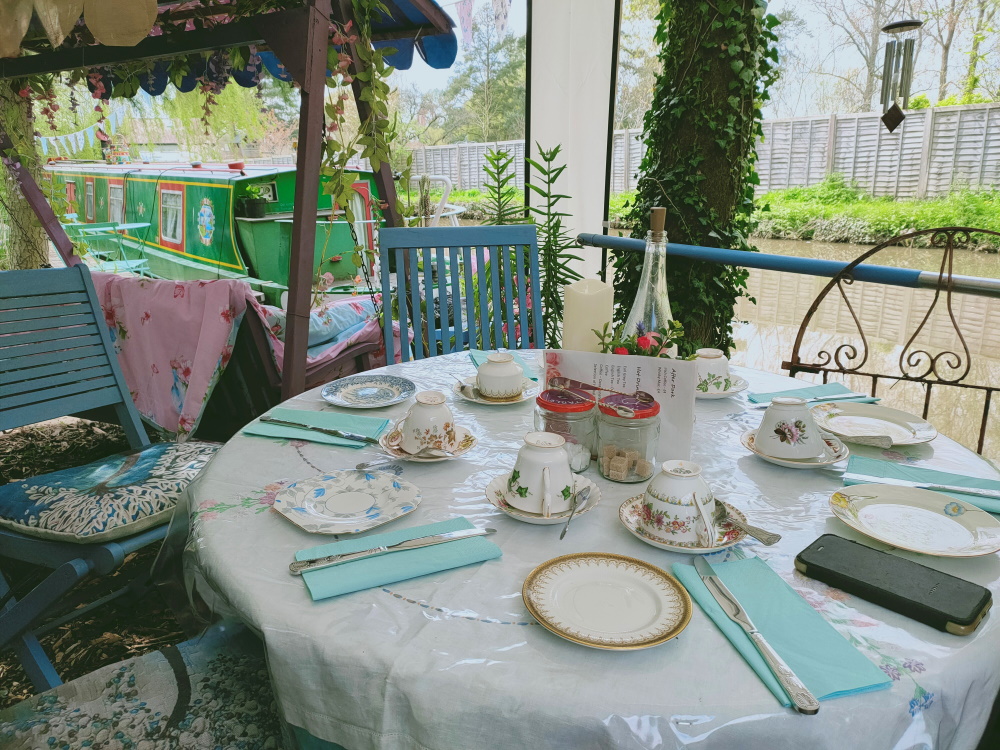
This year Jane has curated the ‘Full Jeeves’ menu, which is £29.50 per person and includes all of the afternoon tea essentials – sandwiches, scones, cakes, tea/coffee and a welcome glass of prosecco. Once we were settled in at our table and dietary requirements had been checked, we were swiftly bought over our tower of goodies. There were three vegetarians and three non vegetarians so we had a cake tower for each.
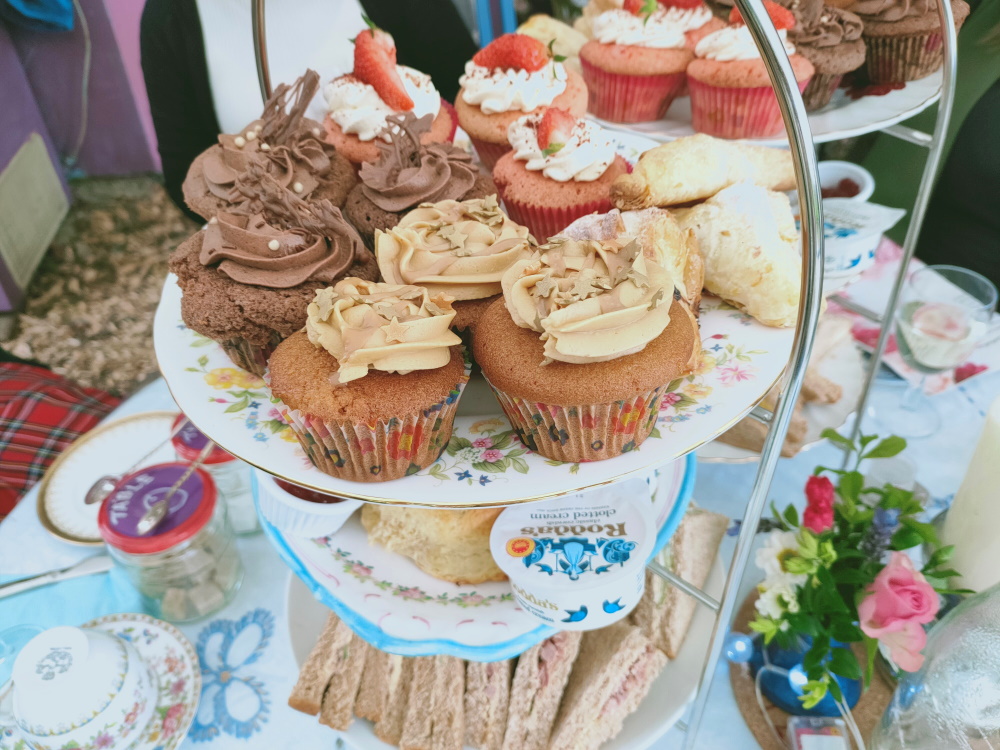
The veggie sandwiches included coronation quorn chicken, cucumber, cream cheese and mint, cheese and chutney and egg mayo and cress. Whilst the meat eaters had the additions of roasted chicken and cranberry, ham hock with mango chutney and tuna mayo and rocket. We all then had a scone each and a delicious selection of homemade cupcakes including caramel, chocolate and strawberries and cream. It was the perfect amount of food to fill you up but still leave you with room for plenty more glasses of prosecco (which is a bargain £16 a bottle btw!)…

The service was very welcoming, friendly and relaxed and Jane popped her head out a couple of times to check in on how we were doing (and to deliver us more prosecco…). The service was a tad slow at times however, we were drinking at a record speed and it was their first weekend of being open, so they were understandably getting back into the swing of things.
We all had such a lovely afternoon! It was amazing to be out post lockdown and even more amazing to go somewhere so fun, unique and special.
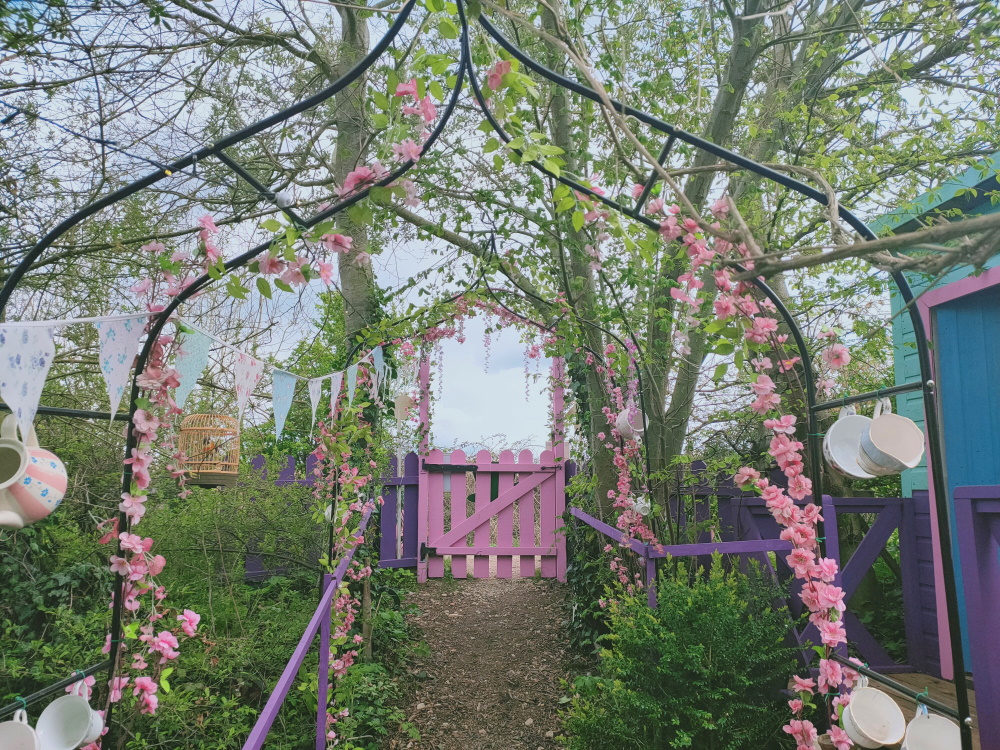
The Verdict
Well, it’s safe to say there is nowhere quite like Jane’s Enchanted Tea Garden in our area, which is why it’s so popular! It’s a unique experience from the moment you enter the garden to the moment you leave – it’s a whimsical jumble of fun décor, excellent home cooked food and relaxed service. The Tea Garden is the definition of a hidden gem and I can’t wait to return again next year to experience it in the evening – imagine all those fairy lights lit up!
To stay up to date on bookings for 2022 or any potential cancellations in 2021, head over to Jane’s Facebook page.
]]>